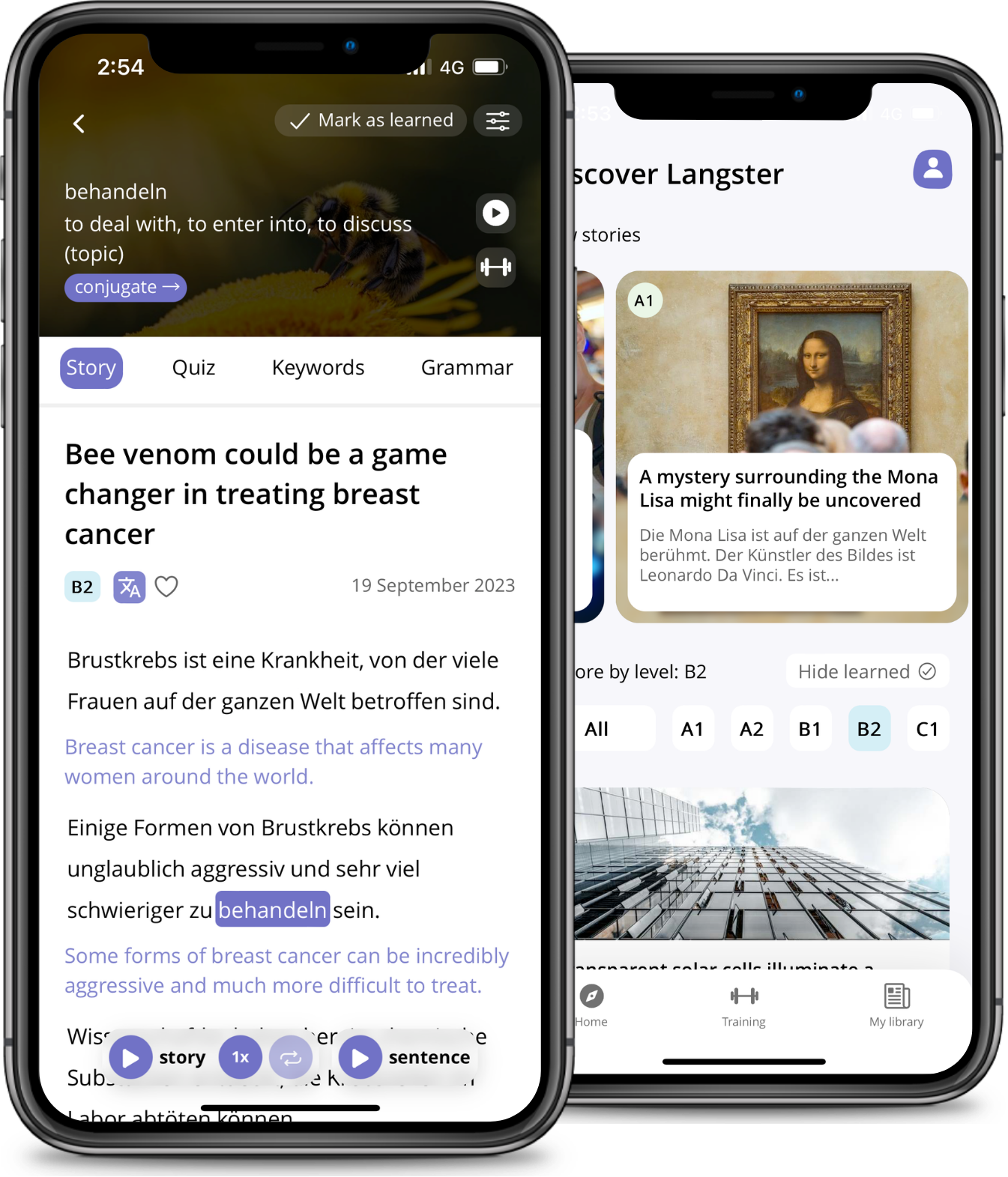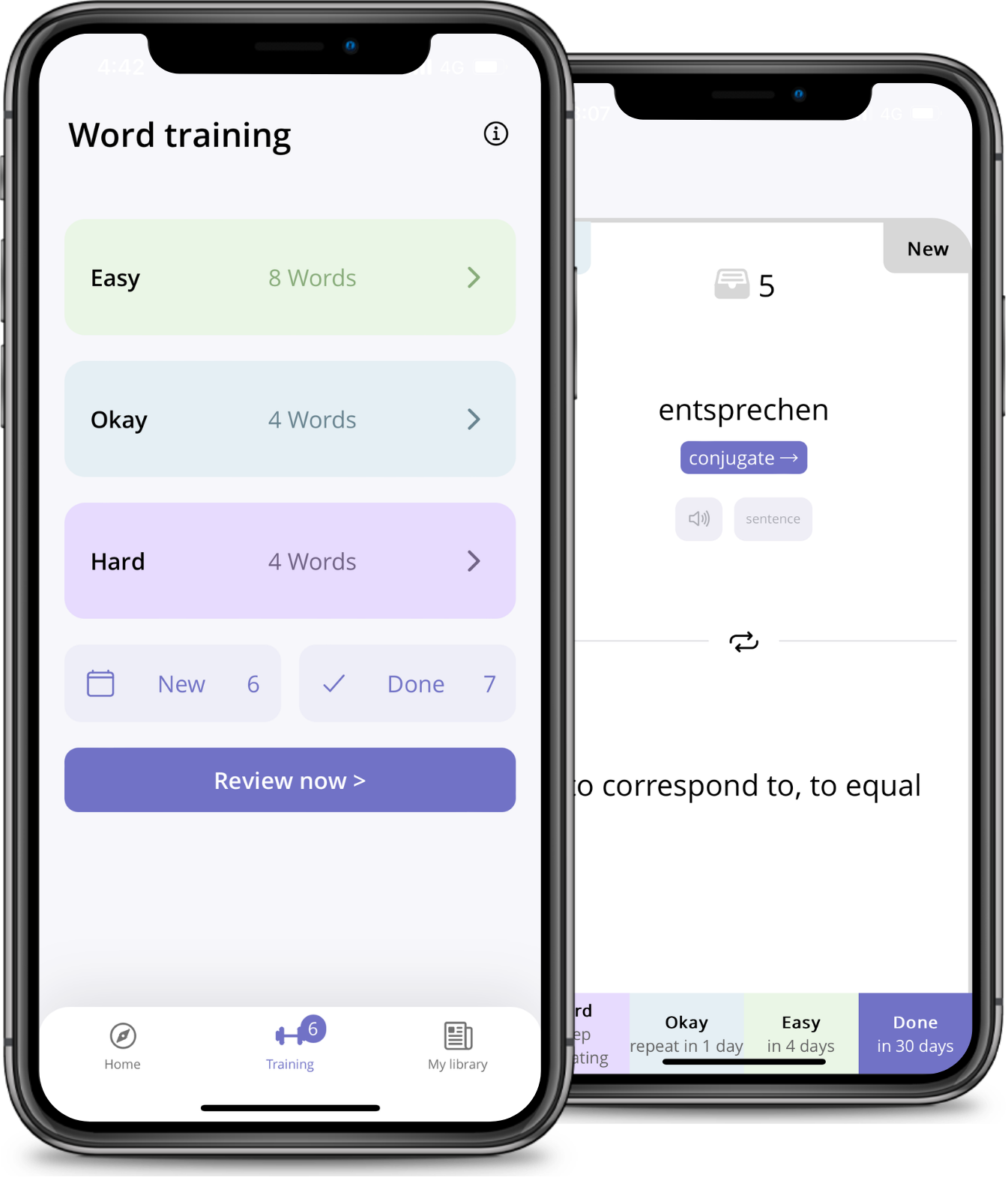Learn German Online With A1 to B2 News & Stories
- 2,000 + short articles to learn German.
- 7-day free trial. Cancel anytime.
- One account for all devices (Desktop, Mobile, Tablet).


4.8
Average Rating
100,000
Downloads
Scientifically
Proven Method
What Real Users and Professors Say About Langster
Exactly what I needed
Love this app. I do my Flashcards daily as a quick and easy German learning activity. And it is amazing to see how much vocab is to be learned by reading the fun varied little articles. Also love that I’m reading at all different levels depending on time and motivation!
A unique app
It was so helpful and custom-made for my learning style that I wanted to write a review, even though I very rarely take the time. I find it wonderful how the developers thought out all the different needs of the learner and sought to meet them with the app.
One of a kind
I don’t write reviews often at all, but I felt compelled to write one for this app. I’ve tried probably 6-8 German language learning apps and this is the best one for my learning style, by far.
Impressed!
I find this app very useful for those that have a little bit of experience with the language that they want to learn. If you start out with no experience, it might be a little difficult in the beginning. Overall I would recommend it, I find it better than Duolingo. :)
Best approach of learning
It’s noticeable that if one consistently use Langster’s approach of learning German, would become a pro in a short period of time!
Experience German Immersion with Thousands of Stories
Langster is your best companion for listening, comprehension & vocabulary training
Pick
one of the daily new stories in our vast library

Add
words & phrases you want to repeat

Train
with spaced repetition and help for context

Grow
and advance from German A1 to B1 in only a few weeks

Stay Motivated to Learn German with Langster

Readle
Traditional textbooks
Join +100,000 People Using Stories to Learn German
Frequently asked questions
What is Langster?
Langster is the world’s first CEFR-graded language-learning reader to learn German, French, Spanish and English. Langster provides premium, instant translations with one tap, audio from native speakers, and grammar explanations in every story.
How do I know that Langster works?
When tested on graded reading, we found that German university students processed and retained vocabulary much faster when using Langster to learn German. Not only that, but they also enjoyed the process more compared to learning with traditional reading and listening material.
Are Langster story lessons free to read?
Users can check in occasionally to take advantage of our rotating free stories, but reading all the stories at once does cost a small fee, which we use to keep improving Langster.
Why you should learn the German language?
Learning the German language opens up a world of opportunities and benefits that make it a truly worthwhile endeavor.
German is not only spoken in Germany but also in other countries such as Austria and the German-speaking regions of Switzerland. With over 100 million native speakers across these countries, learning German instantly connects you to a broad network of people and cultures.
Furthermore, Germany, Austria, and Switzerland are known for their contributions to various industries, including technology, engineering, finance, and tourism. By mastering German, you gain a competitive edge in these sectors and enhance your career prospects.
Additionally, exploring the German language exposes you to a rich cultural heritage, encompassing renowned composers, philosophers, and literary works. Immerse yourself in German culture and deepen your understanding of history, traditions, and the arts. Moreover, bilingualism has been shown to improve cognitive abilities, such as memory, problem-solving skills, and multitasking. By embracing the German language, you not only expand your horizons but also sharpen your mind.
Whether you're seeking professional growth, cultural enrichment, or cognitive development, learning German is a rewarding and valuable pursuit that unveils a world of possibilities.
How long does it take to learn German?
If you're wondering how long it takes to learn German, the answer depends on factors like a prior language learning experience, study time, and immersion opportunities.
It takes approximately 600-750 hours to reach a B2 level of proficiency in German. However, individual progress may vary. To expedite learning, immerse yourself in German-speaking environments, practice with native speakers, and utilize diverse language resources.
Consistency and motivation are crucial. Langster accompanies you on your German learning journey. With dedicated effort, you can improve German at a lightspeed.
What should you know about German grammar?
When it comes to German grammar, there are a few key points to keep in mind. Firstly, German has three noun prepositions for each gender: der (for masculine nouns), die (for feminine nouns), and das (for neutral gender). For example, the word "der Hund" (the dog) is a masculine noun.
Secondly, German has its specific word order, with the verb often occupying the second position in a sentence. For instance, in the sentence "Ich esse einen Apfel" (I am eating an apple), the verb "esse" (eat) appears in the second position after the subject "Ich" (I).
Additionally, German features grammatical cases (nominative, accusative, dative, and genitive) that affect articles, pronouns, and adjectives. For example, in the sentence "Ich gebe dem Mann das Buch" (I give the book to the man), the article "der" changes to "dem" in the dative case (when it's the indirect object of the sentence).
Lastly, mastering German's strong and weak verb conjugations is crucial for expressing actions accurately. Most of the German verbs follow the same system for conjugation in different tenses. In German, those regular verbs are called weak verbs. Apart from them, you have strong verbs - for example, German modal verbs. They change irregularly when conjugated. Examples are the verbs "können" (can) or "wollen" (want).
While German grammar can be challenging, with practice and patience, you can develop a solid understanding of its rules and structures.
Why is learning German so hard?
German is often considered a challenging language for several reasons. Firstly, the presence of long compound words can be overwhelming. German tends to combine multiple words into a single long word, making vocabulary acquisition and comprehension a daunting task.
Secondly, German sentence structure and its case system pose difficulties. The word order in German sentences can be complex, with the verb often appearing at the end. Additionally, the four grammatical cases (nominative, accusative, dative, and genitive) require learners to understand and apply different endings to articles, pronouns, and adjectives, adding complexity to sentence construction.
Furthermore, spoken German can differ significantly from the written form. Informal spoken language often involves dialects, colloquial expressions, and rapid speech, which can be challenging for non-native speakers to understand and follow.
Another hurdle is pronunciation. Pronouncing words correctly, especially those with umlauts (ä, ö, ü), can require practice and attention to detail. German has unique sounds and phonetic rules that may be unfamiliar to learners.
Despite these challenges, learning German is achievable with consistent practice, immersion, and dedication. Taking advantage of language resources like Langster, engaging with native speakers, and embracing the language's rich cultural heritage can enhance the learning experience and make mastering German rewarding.
How to say "How Are You" in German?
The most common word when you greet the person you meet is with Guten Morgen (good morning), Guten Tag (good afternoon) or Guten Abend (good evening). After that, you can start a conversation by asking about the other person's well-being. Depending on the context, you can say, Wie geht es dir? (how are you) or Wie geht es Ihnen? (formal saying, how are you).
A short version of that phrase you will hear a lot is Wie geht's? which is what's up? in English. To respond to the question and tell the other person how you feel, you can usually say Mir geht es gut (I am fine) or Mir geht es nicht gut (I do not feel good) in German. Many people also respond with alles gut (all good).
German Culture
The Germans have a long and proud history that dates back to the time of the Roman Empire. For centuries, they have been one of the most influential European nations, playing a major role in both politics and economics. Today, Germany is a thriving country with a rich culture that attracts visitors from all over the world.
Nevertheless, what many people know today about German culture is based a lot on general stereotypes. Germany is seen as a disciplined, orderly nation that values rules and efficiency above all. And, while it might be true to an extent, there is much more to German culture than just these clichés.
There are much more interesting facts about Germans and their culture from the Germans’ love of beer to their strong work ethic. From the relaxed attitude towards nudity, to the rich history of art and music, Germany is a fascinating country with a lot to offer
German Food
German cuisine offers a rich and flavorful culinary experience. Known for its hearty and satisfying dishes, German food reflects the country's traditions and regional specialties. One iconic dish is "Bratwurst", a type of sausage made with pork, beef, or veal, seasoned with spices, and grilled to perfection.
Another popular favorite is "Sauerkraut", finely shredded fermented cabbage, often served as a tangy and savory side dish. "Pretzels", with their distinctive twisted shape and crunchy exterior, are beloved snacks enjoyed with mustard.
For those seeking comfort food, dishes like "Schnitzel", a breaded and fried meat cutlet, and "Sauerbraten", a pot roast marinated in a tangy sauce, are sure to satisfy. To satisfy a sweet tooth, German desserts like Black Forest Cake, with its layers of chocolate cake, cherries, and whipped cream, and "Apple Strudel", a delicate pastry filled with spiced apples, are delightful treats. Whether you indulge in the savory or embrace the sweet, German cuisine offers a diverse range of flavors and dishes that are sure to please any palate.


